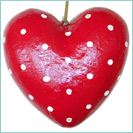
Maybe you've heard this old joke ( advanced practitioners, visualize Rodney Dangerfield):
A man goes to see his doctor and says, "Doctor, doctor, it hurts when I do this." (Visualize the movement of your choice.) The doctor says, "Then don't do that."
Ba-dum-pum. (Rodney shrugs his shoulders, adjusts his tie, and adds, "I don't get no respect," before fading back into the ether.
Rodney Dangerfield as purveyor of the dharma? Yeah, sure. Everything is dharma.
The precepts -- the Buddha's guidelines for living a mindful, joyful, and ethical life -- are Siddhartha's version of Dangerfield's doctor's response. It's as if you went to him and said, "Buddha, Buddha, I suffer when I lie, drink, sleep around indiscriminately, whatever." The Buddha, in his clear, concise way, replies, "Then don't do it."
Sounds harsh, doesn't it? We don't like the idea of giving up our old ways -- but we also don't like the way they make us feel. Hungover. Checking our sent texts to see what we told to who. Wondering who this person is in our bed, in our aching head.
So let's flip the equation. Renunciation in Buddhism is not so much about giving up bad habits as it is about adopting good habits. We give up what makes us feel bad about ourselves, at least in retrospect, and take on what makes us feel good about ourselves. Practicing the precepts is said to result in the bliss of blameless.
I love Thich Nhat Hanh's re-statement of the precepts in his book "For a Future to Be Possible."
1. Aware of the suffering caused by the destruction of life, I vow to cultivate compassion and learn ways to protect the lives of people, animals, plants, and minerals. I am determined not to kill, not to let others kills, and not to condone any act of killing in the world, in my thinking, and in my way of life.
Thich Nhat Hanh has a commentary on the 1st Precept.
2. Aware of the suffering caused by exploitation, social injustice, stealing, and oppression, I vow to cultivate loving kindness and learn ways to work for the well being of people, animals, plants, and minerals.I vow to practice generosity by sharing my time, energy, and material possessions with those in real need. I am determined not to steal and not to possess anything that should belong to others. I will respect the property of others, but I will prevent others from profiting from human suffering or the suffering of other species on Earth.
Thich Nhat Hanh has a commentary on the 2nd Precept.
3. Aware of the suffering caused by sexual misconduct, I vow to cultivate responsibility and learn ways to protect the safety and integrity of individuals, couples, families and society. I am determined not to engage in sexual relations without love and a long-term commitment. To preserve the happiness of myself and others, I am determined to respect my commitments and the commitments of others. I will do everything in my power to protect children from sexual abuse and to prevent couples and families from being broken by sexual misconduct.Thich Nhat Hanh has a commentary on the 3rd Precept.
4. Aware of the suffering caused by unmindful speech and the inability to listen to others, I vow to cultivate loving speech and deep listening in order to bring joy and happiness to others and relieve others of their suffering. Knowing that words can create happiness or suffering, I vow to speak truthfully, with words that inspire self-confidence, joy, and hope. I am determined not to spread news that I do not know to be certain and not to criticize or condemn things of which I am not sure. I will refrain from uttering words that can cause division or discord, or that can cause the family or community to break. I will make all efforts to reconcile and resolve all conflicts, however small.
Thich Nhat Hanh has a commentary on the 4th Precept.
5. Aware of the suffering caused by unmindful consumption, I vow to cultivate good health, both physical and mental, for myself, my family, and my society by practicing mindful eating, drinking, and consuming. I vow to ingest only items that preserve peace, well-being, and joy in my body, in my consciousness, and in the collective body and consciousness of my family and society. I am determined not to use alcohol or other intoxicants or to ingest foods or other items that contain toxins, such as certain TV programs, magazines, books, films, and conversations. I am aware that to damage my body or my consciousness with these poisons is to betray my ancestors, my parents, my society, and future generations. I will work to transform violence, fear, anger, and confusion in myself and in society by practicing a diet for myself and for society. I understand that a proper diet is crucial for self-transformation and for the transformation of society.
Thich Nhat Hanh has a commentary on the 5th Precept.
Happy New Year, dear ones. May it be auspicious!





